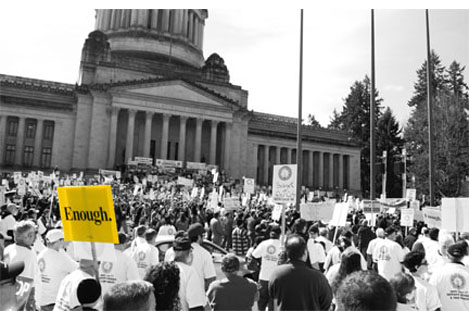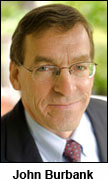OPINION
Follow the money to see how state can best pay its bills
By JOHN BURBANK
(Jan. 16, 2015) — Now that the Legislature is back at work, they have to find the revenues for K-12 education, for higher education, for foster kids, for the mentally ill, for the State Patrol, for home care workers, and early childhood teachers and caregivers.
They also need to confront a fundamental reality of current state financing: We just don’t have the money to pay for high quality education and good and appropriate public goods and services. So our legislators could punt, ignoring the state Supreme Court’s ruling in the McCleary case that they have already violated the paramount duty of government — the education of children. They could ignore the people’s vote for Initiative 1351 to reduce K-12 class sizes and just kick the almost empty bucket down the road for another year.
 Or the Legislature could fully fund both McCleary and Initiative 1351 first, and then figure out how to fund other public services and expenditures. Not all state expenditures make sense, especially what are classified as tax expenditures. These are big and little holes drilled into the budget to benefit one special (and usually well-heeled constituency) or another. Take dealers in precious metal, like gold. A former state senator was very interested in the precious metals retail industry and he arranged a tax exemption through the Legislature that has now been on the books for three decades. It funnels about $23 million a year from public services, such as higher education, to precious metal dealers. Microsoft has benefited from a special tax giveaway for research and development. In 2011 alone, Microsoft received a $145 million tax waiver.
Or the Legislature could fully fund both McCleary and Initiative 1351 first, and then figure out how to fund other public services and expenditures. Not all state expenditures make sense, especially what are classified as tax expenditures. These are big and little holes drilled into the budget to benefit one special (and usually well-heeled constituency) or another. Take dealers in precious metal, like gold. A former state senator was very interested in the precious metals retail industry and he arranged a tax exemption through the Legislature that has now been on the books for three decades. It funnels about $23 million a year from public services, such as higher education, to precious metal dealers. Microsoft has benefited from a special tax giveaway for research and development. In 2011 alone, Microsoft received a $145 million tax waiver.
Microsoft also gets away with not paying taxes on any of the profits it makes from investments in the stock market. When you count up all the mega-corporations that take advantage of this one tax break, the bill to our state runs to $175 million a year. Oil companies get a special $30 million a year tax break in our state. The only other state to give this tax break to Big Oil is Alabama.
If we simply stopped using public money to fund private interests, we could make a dent in the getting education funding up to the level we need to truly prepare all our kids for life in today’s rapidly changing world. But ultimately, it is time to go to where the money is.
Where is that money? It is not in the pockets of middle-class families. You can’t find it in the payday loans of minimum wage workers. So if the economy is doing well, where is that money? It is in the bank accounts of the very wealthy citizens of our state.
In Washington, the income of the top 1 percent grew by 45 percent between 2009 and 2012, more than all combined income growth in the state. How did they receive more than all income growth? This bonus came from the working families. The bottom 99 percent saw their average real income fall by 3.5 percent. It gets worse: from 2007 to 2012, income for the average household in the bottom 99 percent fell by $8,500.
So show me the money! The average income for the top 1 percent of households in our state was $ 1,272,313 in 2012 (estimated from IRS tax data.) These households, about 30,000 of them, saw their annual income increase by almost $400,000 since 2009. You can bet it has gone up more in the past couple of years, so it is closer to $1.5 million now.
What would happen if our state levied an income tax of 4 percent on these households? Instead of a $400,000 increase in household income, the 1 percent would have realized a $350,000 increase over the past four years. On the other hand, the revenue from the 4 percent income tax would equal about $1.5 billion a year. What could that pay for? It would completely cover tuition for all community college students. We could reduce the tuition at four-year public universities to $5,000, and still have $400 million to fund foster care, home health care and early childhood education.
 We elect the Legislature. But do they work for us, or are they more concerned about protecting the deep pockets of mega-corporations and the fabulously wealthy? We will find out!
We elect the Legislature. But do they work for us, or are they more concerned about protecting the deep pockets of mega-corporations and the fabulously wealthy? We will find out!
John Burbank is the executive director and founder of the Economic Opportunity Institute in Seattle. John can be reached at john@eoionline.org.





